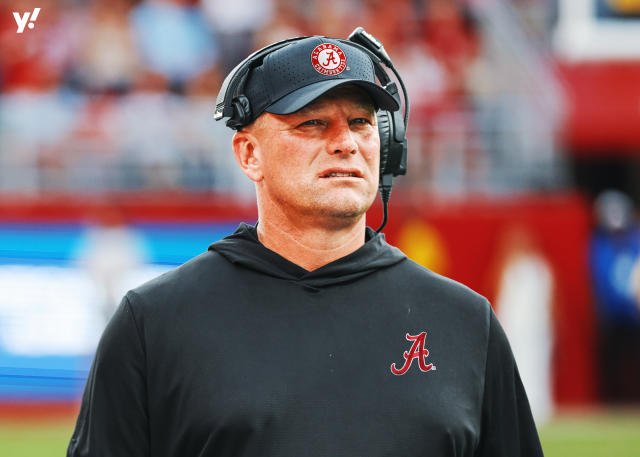Blog
SACK UPDATE: Head Coach Kalen DeBoer Has Been ‘SACKED’ Due To…

Kalen DeBoer, the head coach of the Washington Huskies, has been “sacked” following a string of disappointments that led the program to part ways with him sooner than expected. His dismissal, while surprising to some, reflects a culmination of factors both on and off the field that ultimately sealed his fate. The coach, who came to Washington with a reputation for offensive innovation and a strong track record in previous roles, found himself unable to deliver the consistency and upward trajectory the program hoped for when it brought him on board. Despite initial optimism, DeBoer’s time with the Huskies came to an end after a series of setbacks that made it clear a change was necessary.
DeBoer was hired with high expectations, having shown promise in his previous coaching stops, including a successful stint at Fresno State, where he led a turnaround and quickly established a winning culture. The move to Washington was seen as a significant step up, but one that came with added pressure and higher stakes, given the Huskies’ aspirations to compete at the top of the Pac-12 and return to national prominence. Washington, a program with a storied history and a passionate fan base, demanded excellence, and DeBoer was tasked with bringing back the kind of success that the team had not consistently seen in recent years.
The early part of DeBoer’s tenure showed promise, as the team demonstrated glimpses of an explosive offense and a competitive spirit that suggested a brighter future ahead. However, as time went on, the inconsistencies began to mount, and the Huskies struggled to find a steady rhythm. Close losses against teams that were seen as beatable raised red flags about the team’s ability to perform in critical moments, and questions started to emerge about the effectiveness of DeBoer’s game plans and in-game adjustments. There was an increasing sense that the team lacked a clear identity and struggled to execute the fundamentals, particularly on defense.
While the offensive side of the ball showed some progress, with individual players putting up respectable numbers, the overall unit failed to maintain a level of consistency necessary to compete at the top of the conference. There were games in which the offense seemed to click, but those performances were often followed by frustrating outings where the Huskies could not sustain drives or convert on key third downs. The defense, traditionally a strength of Washington football, faltered under DeBoer’s tenure, giving up too many big plays and struggling to contain opposing offenses. The team’s inability to make stops in crucial situations was a recurring theme, and as the losses piled up, confidence in the coaching staff began to erode.
The decision to sack DeBoer was accelerated by a series of disappointing results in high-profile games. The Huskies found themselves outclassed in contests against rivals and top conference opponents, which underscored the gap between Washington and the elite teams in the Pac-12. These losses were not merely setbacks but blowouts that exposed the program’s shortcomings and fueled the perception that DeBoer was not the right coach to close the gap. With each defeat, the pressure mounted, and it became increasingly clear that the program needed a fresh start.
Off the field, there were also issues that contributed to DeBoer’s dismissal. While there were no major scandals, there were concerns about the overall culture within the program. Reports of dissatisfaction from players emerged, with some expressing frustration over what they felt was a lack of direction and accountability. There were also whispers of tension between the coaching staff and some players, particularly concerning how certain personnel decisions were handled and the approach to discipline and preparation. Although such internal challenges are not uncommon in struggling teams, they added to the growing sentiment that DeBoer was losing control of the locker room.
Recruiting, a vital aspect of sustaining success in college football, also became an area of concern during DeBoer’s tenure. While Washington did manage to secure some talented prospects, the program’s overall recruiting success lagged behind its competitors in the Pac-12. The inability to consistently land top-tier recruits raised questions about the staff’s strategy and its ability to connect with high school talent. The recruiting struggles, combined with the on-field performance issues, painted a picture of a program that was not on the path toward improvement.
The decision to sack DeBoer also involved financial considerations, as the university had to weigh the costs associated with his contract buyout. Despite these financial factors, the administration concluded that the potential long-term consequences of keeping him outweighed the immediate expenses of moving on. For Washington, the priority was to avoid slipping further into mediocrity and to bring in a coach who could reinvigorate the program and meet the high expectations that come with the job.
DeBoer’s departure marks yet another coaching change for Washington, a program that has experienced a fair share of turnover in recent years. The constant changes in leadership have made it difficult for the team to establish stability and continuity, which are crucial for building a successful college football program. The Huskies will now embark on yet another coaching search, with the goal of finding a candidate who can bring consistency, elevate recruiting, and foster a winning culture that extends beyond just occasional flashes of promise.
As for DeBoer, this dismissal represents a significant setback in his coaching career. While he has shown that he can succeed at smaller programs, his time at Washington highlighted the challenges of transitioning to a higher level of competition where the stakes and expectations are much greater. The experience may serve as a learning opportunity, but it also leaves his future uncertain. Whether he will seek another head coaching opportunity at a different program or take on a coordinator role remains to be seen.
The sacking of Kalen DeBoer underscores the high-pressure environment that defines college football, particularly within the Power Five conferences. Programs like Washington, which have a history of success and ambitious goals, are quick to make changes when the desired results are not achieved. The decision to part ways with DeBoer reflects the program’s determination to not settle for mediocrity and its commitment to returning to the top tier of college football.
For the players, the immediate focus will shift to adjusting to an interim coaching staff and navigating the remainder of the season with uncertainty. How the team responds to the coaching change will be telling, as they attempt to salvage a season that has not gone as planned. The players will have an opportunity to prove that they can rise above the distractions and end the season on a positive note, despite the turmoil.
In the end, Kalen DeBoer’s sacking serves as a reminder of the unforgiving nature of the sport, where the margin for error is slim and expectations are relentless. For Washington, the quest for the right coach to lead the program forward continues. The search will be crucial in determining the Huskies’ future, as they aim to find a leader who can restore the program to its former glory and ensure that the next chapter is marked by growth, stability, and sustained success.
-

 Blog3 months ago
Blog3 months ago“Voglio lasciare la Fiorentina” Yacine Adli sorprende la Fiorentina con una richiesta di trasferimento improvvisa
-

 Blog3 months ago
Blog3 months agoUltime notizie: Alisha Lehmann ha rescisso il suo contratto con la Juventus e dovrebbe lasciare il club la prossima stagione a causa di…
-

 Blog3 months ago
Blog3 months agoUltime notizie: rivelata la nuova data per la partita Inter Milan-Fiorentina
-

 Blog2 months ago
Blog2 months ago“Voglio andare via”. Yacine Adli sorprende i tifosi della Fiorentina, dicendo che vuole lasciare la Fiorentina per
-

 Blog7 months ago
Blog7 months agoTRISTE NOTIZIA: L’allenatore della Juventus Thiago Motta è rimasto coinvolto in un incidente stradale a causa…
-

 Blog1 month ago
Blog1 month agoUltime notizie: finalmente Sandro Tonali ha firmato….ha accettato di tornare al Milan, accordo firmato e sigillato
-

 Blog2 months ago
Blog2 months agoIl più grande affare di trasferimento…Eccoci qui!!!! Affare fatto Victor Osimhen ha accettato l’enorme accordo della Juventus per un valore di…
-

 Blog3 months ago
Blog3 months agoUltime notizie: Francisco Conceição e l’FC Porto hanno rifiutato l’offerta di trasferimento di 70 milioni della Juventus a causa di
